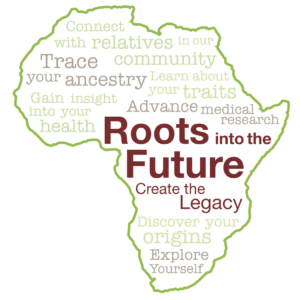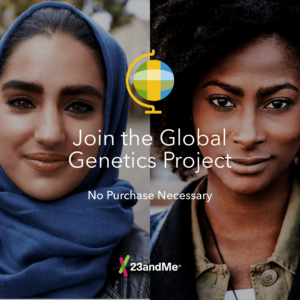February marks a time to remember and celebrate people of the African diaspora. To kick off a Black History Month of reflection, we’d like to highlight some of the projects 23andMe has been working on to specifically address disparities in biomedical and genetic research for people of African ancestry.
Research shows that genetic studies that include diverse, multi-ethnic participants have a higher chance of discovering important genetic variants associated with diseases. Those associations would have been missed in studies that focus only on one homogenous group.
We Need to Do Better
Despite this, as of 2019, only two percent of participants in genome-wide association studies around the world were people of African ancestry. Additionally, genetic risk prediction scores, which will be instrumental in the future of personalized medicine, need to take ancestry into account. A risk score developed for one population may not be as accurate for another, exacerbating already existing health disparities for African Americans.
But it’s not enough for us to wait for others to fix the problem. As our CEO Anne Wojcicki stated last June, “We absolutely have the potential to be better. Despite our efforts, I have to honestly say that we are also part of the problem.”
Some History
Over the years, we have made an effort to ensure our product and research are relevant to those of African ancestry. Here is a snapshot of our progress over the last decade:
2011: We launched our Roots into the Future project to recruit 10,000 African Americans to participate in research.
2013: We launched our first African Ancestry Project, which recruited people with four grandparents from Sub-Saharan Africa.
2014: With this additional data from people of African ancestry, we published the first large-scale study of genetic ancestry in the United States that reflects historical migrations.
2015: Using external research, we launched our Health service with a report for sickle cell anemia and a report for beta-thalassemia and related hemoglobinopathies, among others. Both of these conditions are highly relevant for people with African ancestry.
2016: We reached the milestone of 45,000 African Americans participating in 23andMe research.
2016: We received a National Institutes of Health (NIH) grant to help us develop a new analysis pipeline that may alleviate disparities in research.
2016: We launched the African Genetics Project, further recruiting individuals with ancestry from one of 16 African countries, expanding our recruitment outside of Sub-Saharan African ancestry.
2016: We launched the African American Sequencing Project, which also received funding from the NIH, to create a genomic reference panel that was shared with the broader scientific community for research.
2017: We launched the Global Genetics Project, further recruiting individuals underrepresented in genomics research, including 45 countries in Africa.
2018: We launched our Populations Collaborations Program, which partners with academic researchers working across the globe to genotype people in communities who are underrepresented in genetics research, including Angola, Madagascar, and the Democratic Republic of the Congo.
2018: Thanks to contributions from our African Genetics Project and Populations Collaborations Program, we updated our Ancestry Composition report to now reflect nine additional ancestry regions within Africa.
2018: Using external research, we developed a health report for G6PD deficiency, a blood disorder that can affect one in 10 African American men.
2019: We reached the milestone of 295,000 African Americans participating in 23andMe research, which is six times our cohort size just four years prior!
2019: The de-identified data from the African American Sequencing Project was made available to qualified researchers through the National Center for Biotechnology Information’s database of Genotypes and Phenotypes (dbGaP), allowing other qualified researchers to improve the accuracy of their genetic research on people of African descent.
2019: Using external research, we developed a report for TTR-related hereditary amyloidosis. About one in 28 African Americans is estimated to have a gene variant that predisposes to this heart condition.
2020: We expanded our Global Genetics Project to specifically recruit from subregions within Nigeria.
 2020: We launched our Black Representation in Genetic Research study, which will conduct RNA sequencing that will also be made publicly available to qualified researchers when complete.
2020: We launched our Black Representation in Genetic Research study, which will conduct RNA sequencing that will also be made publicly available to qualified researchers when complete.
2020: Our Research Innovations Collaborations program made a specific call for proposals that are of high significance for underrepresented populations, including groups with African ancestry, in order to further address health disparities.
2020: Using external research, we developed a report for APOL1-related chronic kidney disease. Chronic kidney disease (CKD) is common and underdiagnosed, and the risk for severe disease is about three times higher in African Americans. About one in eight African Americans has a genetic predisposition for CKD due to variants in the APOL1 gene.
2021: 23andMe now has one of, if not the largest research cohort of genotyped and phenotyped people of African ancestry, with hundreds of thousands of individuals consenting to participate in research.
Studies Relevant to the Black Community
Because of these recruitment efforts, 23andMe has already been able to conduct health-related genome-wide association studies specific to people with African ancestry for example around uterine fibroids and alcohol and tobacco use. This research may also help us develop more health reports that are particularly important for this group. Foundational studies like these are key to reducing disparities in health care in the future.
Thanks to this research, we have also learned more about human history and migration, and can now match customers to over 150 subregions within Africa. We also recently published one of the most comprehensive investigations of the genomic consequences of the transatlantic slave trade ever done in the American Journal of Human Genetics.
 And this is only the beginning. With all this new data, the next few years should see a slew of new studies of particular interest and relevance to those of African ancestry. In addition to improving the inclusivity of our research and product, we are also committed to Diversity Equity and Inclusion across the board. That includes our hiring practices and employee experience, as well as community impact. And as Anne said, we’re asking that our customers hold us accountable. So keep checking back to make sure we’re advancing genetic research for all people, regardless of their ancestry.
And this is only the beginning. With all this new data, the next few years should see a slew of new studies of particular interest and relevance to those of African ancestry. In addition to improving the inclusivity of our research and product, we are also committed to Diversity Equity and Inclusion across the board. That includes our hiring practices and employee experience, as well as community impact. And as Anne said, we’re asking that our customers hold us accountable. So keep checking back to make sure we’re advancing genetic research for all people, regardless of their ancestry.
*The 23andMe PGS test uses qualitative genotyping to detect select clinically relevant variants in the genomic DNA of adults from saliva for the purpose of reporting and interpreting genetic health risks and reporting carrier status. It is not intended to diagnose any disease. Your ethnicity may affect the relevance of each report and how your genetic health risk results are interpreted. Each genetic health risk report describes if a person has variants associated with a higher risk of developing a disease, but does not describe a person’s overall risk of developing the disease. The test is not intended to tell you anything about your current state of health, or to be used to make medical decisions, including whether or not you should take a medication, how much of a medication you should take, or determine any treatment. Our carrier status reports can be used to determine carrier status, but cannot determine if you have two copies of any genetic variant. These carrier reports are not intended to tell you anything about your risk for developing a disease in the future, the health of your fetus, or your newborn child’s risk of developing a particular disease later in life. For certain conditions, we provide a single report that includes information on both carrier status and genetic health risk. For important information and limitations regarding each genetic health risk report and carrier status report, visit https://www.23andme.com/test-info/.



